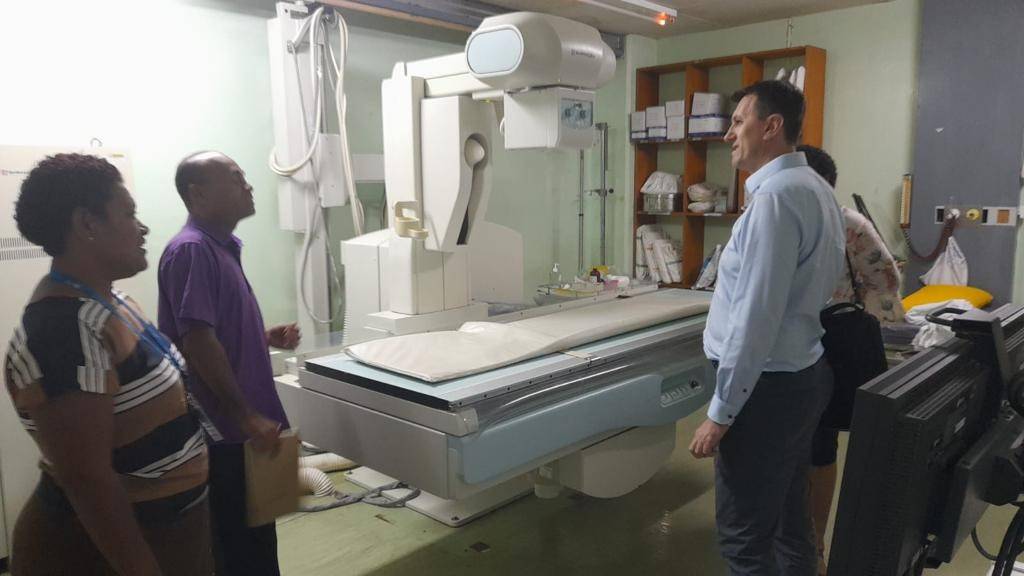
A New Era in Cancer Care for Liberia
Liberia has taken a significant step forward in its battle against cancer with the groundbreaking ceremony for the country's first National Radiotherapy Center. This historic event, held at the John F. Kennedy Medical Center (JFK) in Monrovia, marks a pivotal moment in the nation's health infrastructure development.
The ceremony was attended by President Joseph Nyuma Boakai, Sr., and Rafael Mariano Grossi, Director General of the International Atomic Energy Agency (IAEA). Their presence underscored the importance of this initiative not only for Liberia but also for the broader region.
A Regional Hub for Cancer Care
Once completed, the state-of-the-art facility will offer life-saving radiotherapy services to thousands of Liberians. It is expected to position Liberia as a regional hub for cancer care within the Mano River Union. The center aims to address a critical gap in the country’s healthcare system, where access to advanced cancer treatments has been limited.
Rafael Mariano Grossi emphasized the significance of the occasion, calling it a symbol of hope and healing. He highlighted that the project is part of the IAEA's 'Race of Hope' program, which seeks to bridge the global gap in cancer care by expanding access to radiotherapy.
Expanding Access to Early Detection
As part of the initiative, the IAEA announced the donation of Liberia's first mammography unit. This equipment will enable the screening of up to 100 women daily for early detection of breast cancer. Grossi outlined a phased approach that includes mammography, brachytherapy, and eventually full radiotherapy treatment.
"Without radiotherapy, the chance of survival for many cancer patients is significantly reduced," Grossi said. "Today is not about words, it's about concrete action. We are here to stay and support Liberia's journey in improving cancer care."
A Transformative Achievement
President Boakai hailed the project as a transformative achievement in Liberia's post-war health infrastructure. He described the groundbreaking as more than just a construction project; it is a testament to the country's commitment to health and international cooperation.
Under the ARREST Agenda for Inclusive Development, health is a priority. The president emphasized that the center will make cancer treatment accessible, affordable, and available to all Liberians.
He also highlighted Liberia's longstanding relationship with the IAEA, dating back to its membership in 1962. The country aligns with the United Nations Sustainable Development Goals (SDGs), focusing on key thematic areas such as health, energy, agriculture, and water resources.
A Long-Awaited Breakthrough
Health Minister Dr. Louise Kpoto described the moment as a long-awaited breakthrough. She recalled her inspiration from Malawi's success with IAEA-supported cancer treatment and praised the cross-sector collaboration that led to the project.
"Cancer remains a major public health burden in Liberia, with cervical, breast, liver, and prostate cancers accounting for 70% of diagnoses," she said. "The lack of radiotherapy has left our clinicians with incomplete treatment options. This center is not only a treatment facility but also a training and research hub."
Dr. Kpoto acknowledged the dedication of local oncologists, surgeons, and nurses who have continued to serve despite the limitations. She emphasized that the new center will significantly reduce the need for patients to travel abroad for treatment.
Restoring Vital Services
CEO of JFK Medical Center, Dr. Linda A. Birch, called the ceremony a "historic milestone" for the hospital and the nation. She outlined the critical importance of radiotherapy in a complete cancer care continuum.
"JFK once had a cobalt machine for cancer treatment, which was destroyed during the Civil War. Since then, we've lacked the means to offer comprehensive care," she said. "Today's groundbreaking is the first step in restoring that vital service."
Dr. Birch detailed the benefits of the new center, which include providing multi-modal cancer treatment, reducing out-of-pocket costs, building local medical capacity, and saving lives. She also noted the potential for Liberia to become a destination for medical care in the sub-region, contributing to national development goals.
"With the establishment of this center, cancer patients will no longer have to travel abroad for treatment. They will be able to receive world-class care right here at home," she concluded.
A Shared Commitment to Progress
The event concluded with expressions of gratitude from all stakeholders and a shared commitment to seeing the project through to completion. The radiotherapy center is expected to not only fill a critical gap in Liberia's health system but also serve as a symbol of national progress and resilience.
Post a Comment